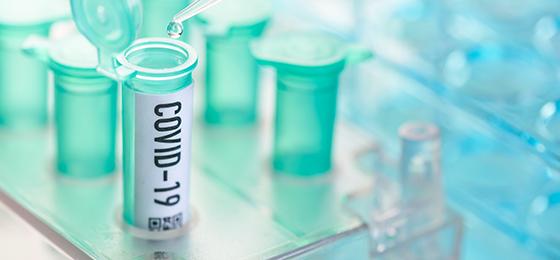28 new coronavirus research projects funded under NRP "COVID-19"

New research has been launched to better control COVID-19. 18.6 million francs have been invested in projects that will investigate innovative solutions and develop public health recommendations.
Mandated by the Federal Council, the SNSF launched the National Research Programme "COVID-19" (NRP 78) on 30 April 2020 to advance our understanding of the coronavirus disease 2019 (COVID-19), provide recommendations for clinical management and public health, and expedite the development of vaccines, therapeutics and diagnostics. The research projects to be funded have now been selected. An overview:
Applications submitted: 190
Applications rejected for formal reasons: 1
Applications retracted: 1
Applications evaluated: 188
Projects approved in biomedicine, clinical research, epidemiology and prevention: 23 out of 154
Projects approved in mathematics, natural and engineering sciences: 1 out of 19
Projects approved in the humanities and social sciences: 4 out of 15
Experts from Switzerland and abroad reviewed the applications and the best ones were selected by an international evaluation panel. Competition for the available funds was intense, with the panel finding itself forced to reject many excellent projects. Around 15 per cent of the applications can be funded with the money available.
From the immune response in people infected with Sars-CoV-2 to protective measures in tourism
The funded projects reflect the wide thematic range of NRP 78. They are listed in the project registry for COVID-19 research in Switzerland. Four examples:
- Onur Boyman, Jakob Nilsson from University Hospital Zurich, Bernd Bodenmiller from the University of Zurich and Daniel Pinschewer from the University of Basel want to learn more about the primary immune response and the initial memory phase of the immune system in both mild and serious cases of the illness. This knowledge is of importance for clinical diagnoses and supply, vaccine development and political decision-making.
- Timo Ohnmacht from the Lucerne University of Applied Sciences and Arts and his team are investigating how a pandemic changes the way people travel, and to what extent non-pharmaceutical interventions such as social distancing, handwashing and wearing a mask are accepted and complied with during the holidays. This could help improve containment measures in the tourism sector.
- Sandrine Gerber from EPF Lausanne, Igor Stefanini from the University of Applied Sciences and Arts of Southern Switzerland (SUPSI) und Francesco Bertoni from Università della Svizzera italiana (USI) are developing a small, portable device that would detect the new coronavirus (Sars-CoV-2) at airports, train stations and other public spaces where fast-tracked screening can contribute to early detection of the disease.
- Marc Yves Donath from the University of Basel, Manuel Battegey from University Hospital Zurich and Philip Schütz from Aarau cantonal hospital are launching a multicentric study with diabetes patients, who belong to a particularly vulnerable group of people. The aim is to test the efficacy of the drug Canakinumab in the treatment of inpatients suffering from COVID-19 and type-2 diabetes.
Steering Committee and start of research
The next step will involve setting up a Steering Committee for the NRP. The Committee will advise researchers and contribute to the implementation of research results. Its members are national and international experts, and it includes one representative each of the Federal Office of Public Health (FOPH) and Innosuisse.
The research projects can start at once to ensure that the results of the two-year research programme are available as soon as possible. Authorities, politicians, health professionals, citizens and public institutions can expect to receive the necessary scientific information for evidence-based decisions that protect public health and help normalise public life and the economy.
The mission of NRP "COVID-19" is to promote collaboration between researchers and practitioners as well as the health authorities, and to organise conferences where exchanges between different scientific disciplines can take place. In this context, the projects of the special call of the SNSF for coronavirus research and of NRP "COVID-19" will be considered together.